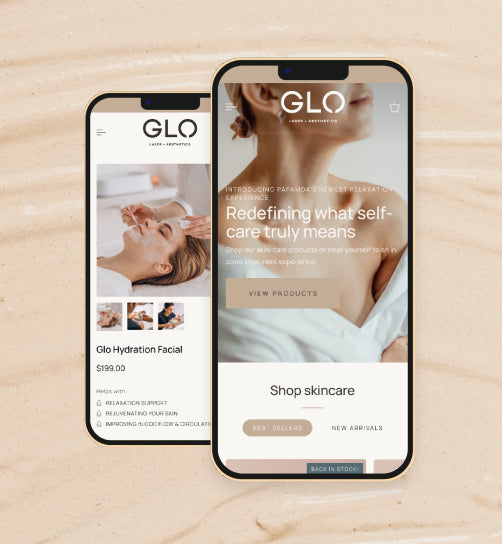Streamline Your Processes and Save Time with Shopify Integration
When you’re running your online store, you want to be working smarter, not harder.
We’re sure you’ve heard all about online automations; smart online applications and flows that can be set-up to transform the way your sales and processes run. They’re genius. But sometimes even with automation processes there’s still some work to do behind-the-scenes.
Now we know you’ve got more important things to be working on than manually transferring data between apps, so what if we told you that there was a way to streamline your information flow even further – cutting back that tiresome, manual work completely?
Enter integration; the next step to uplevel your site and streamline your sales flow. At Zyber we’re integration specialists, and know it’s possible to create an integration system that will specifically suit your business – so let’s get into it.
Integration 101 – Meet Your Business Saviour
What exactly is integration, and what does it look like?
Integration – put simply – is the interconnectivity between the apps and flows you already have in place. A basic example would be a received payment in PayPal, triggering an action in your accounting software.
Many of the businesses we work with come to us with different programmes they’re using to manage their business. With integration, we set up those programmes to automatically work with one another, meaning you don’t need to do it manually – it’s all done for you..
To help get your head around it, we’re going to have a look at a few different forms of integration – then we’ll show you some of the different ways embracing integration will benefit you and your business.
Integration includes:
- API
- Field Mapping
- Webhooks
Get ready to start saving serious time and money – we’re talking about completely streamlining your eCommerce business, and creating a customer-friendly experience that’s a step above the rest.

The different faces of integration
Let’s break some of these terms down.
API
Application Programming Interface, or API for short, is a tool used by programmers when creating software. APIs are everywhere – loaded into even the basic settings of your software. The basic idea of an API? Behind the scenes all your programmes are communicating with one another, and the API is the messenger between them.
Shopify offers a wide range of APIs – giving peak functionality at every stage of your store’s operation. By leaving this up to the experts and the Shopify platform, the process is smooth and the legwork is done; so you can spend more time doing what you do best (running your business).
Webhooks
Webhooks work in similar ways to APIs, in that they tell your various apps to send automated messages and information to one another. They allow your online accounts to speak to one another – for example, if you receive a payment into your bank account, Xero knows the money has been received.
They work in the same way that SMS or TXT messages work – when an action happens in one app, a message is sent to another to let it know what has happened and to act accordingly.
These messages save you keeping an eye on one app to make sure something has happened, and then going into one or two apps afterwards to make the appropriate updates.
Field Mapping
Field mapping takes your integration one step further. It’s the process of determining which data you want to move into a particular field – so when mixed in with integration, field mapping involves transporting data from fields in one app, to fields in another.
It allows you to send custom form fields over to your integration service – for example if you mapped the ‘first_name’ field from a certain software into the Shopify API name field, you would have the data transferred automatically – without having to manually enter it. This means every time someone entered their first name into a field in an associated app, the data would be exported into Shopify.
So now that we’ve covered off what integration is, why should you use it with Shopify? How’s it going to benefit you and your sales?
A smooth process with Shopify and Zapier
If your site and business need specialty integration, Shopify experts can deliver custom development to ensure your website is running perfectly. We’ve said it before and we’ll say it again – taking time to get integration and automation running effectively will save you a lot of money in the long run.
A lot of integration is done through custom development – allowing developers to give your site the exact solution you need. Shopify has the ability to professionally support developers for integration and customisation – as the leading e-commerce service for small to medium businesses, the Shopify platform is designed to grow with you, including offering and supporting Shopify Experts in development. The Shopify’s APIs are also known to be ‘developer friendly’ – in that they don’t dictate or prefer one Operating System over another, or a specific architecture design over others.
Occasionally, there’ll be a request for quick changes, and new or smaller businesses need to work with a budget-friendly option. .
When this is needed we recommend using tools like Zapier to integrate systems, avoiding the time needed to create everything from scratch. Zapier allows you to connect Shopify to over 2,000 apps, ranging from Google Sheets, to Mailchimp, to Gmail. Each of these integrations is designed to save you time twofold – both in getting it up and running, and in day-to-day use.
Zapier’s prebuilt Zaps – or automated workflows – allow you to seamlessly move data between apps. The Zaps work between the software you’re connecting, with a standard monthly fee per amount of Zaps used
If you need some hard evidence that one programme can really do that much for you, check out our 7 Ways to Streamline Your Business with Zapier + Shopify blog to see the sheer range of programmes you can link to, and just how great the benefits are.
Revolutionise Your Business
As the leading Shopify experts in NZ, we know exactly what we’re doing when it comes to integrations, and we’ve seen a fair few pass through our doors. Here’s what we’ve noticed.
You’ll save time and money

There’s one obvious advantage to integration that can’t be overstated – it’s going to save you time. We know that sounds appealing – it’s one of the main reasons you’re doing this after all.
These days it feels impossible to run a business without wearing a multitude of different hats to keep it running – but while this modern world may have created this beast by giving us a program for every task, it’s also given us the solution.
By embracing integration, Shopify experts can automate a number of different features that you would otherwise be doing manually, including:
- inventory management
- standardising merchandising and product organisation
- managing staff access and permissions across your entire organisation.
We all know that time is money, so you’ll immediately see the benefits in your businesses back pocket. Integration takes care of all those time-consuming jobs, leaving you room to focus on the big ones.
You’ll be able to keep working with programmes you know
Popular integrations we’ve seen and implemented for NZ and Australian merchants include:
- Xero
- MYOB
- NetSuite
- Quickbooks
- Microsoft 365
- Salesforce
- Hubspot
- SAP Business One
These Enterprise Resource Plannings (ERPs) come partially set up – a Shopify expert will then do the crucial work of modifying and detailing it to suit you and your eCommerce venture. Think of it like buying the shell of a car – it looks good, but it’s not a lot of use until we put the engine in.
-
Xero: Integration with Xero provides you with a range of features including syncing your inventory to your accounting system and recording merchant and platform fees to correct clearing accounts. The best feature by far – Xero connects your transaction data to your accounting system. It can be done either transaction by transaction, or at certain intervals – whatever way you want to run your business, Xero will work around you.

partner-xero
- NetSuite: NetSuite is our most common ERP, due to the way it suits businesses of every size. NetSuite integration comes with a huge range of benefits, and is able to manage your customers’ orders from the beginning to the end. NetSuite manages and syncs every part of the order process from inventory, customers, refunds, and fulfillment – it even uses field mapping to transfer your customers’ details into Shopify for future use.

Image Source: NetSuite
- Salesforce: The benefits you’ll reap from integrating with Salesforce are countless. Their Customer Relationship Management (CRM) model creates a seamless connection between your customer and your company, as it ensures all information shared by your customers or consultants is transferred through the system for everyone who needs it.

By doing the groundwork to tailor the ERP to suit your business needs, we make sure all the essential foundations to your integration are covered. This means that everything is running as smoothly as possible – you get optimum value out of your investment, and can rest easy knowing that part of your business is totally taken care of.
Tailored customer service
Integration doesn’t just make your business easier for you to use – when done right, integration also makes it easier for your customers too. By allowing your different programmes to work seamlessly with one another and trade information about your customers, you can also provide a tailored and improved customer experience.
Convenience is king, and the modern eCommerce world is a battleground of retailers trying to provide the easiest service. Think about these potential issues a customer may face trying to buy from a website:
- A website taking too long to load
- Having to re-enter details that the website should have remembered
- Malfunctions with their cart
The moment something becomes too difficult, your customers will be turned off your website – that’s a lost sale, and it’s not what we’re about.
At Zyber we have access to a range of tools to ensure that your Shopify store runs as smoothly as possible for both you and your clients. Tools like Spently allow you to monitor analytics, create automated email sequences, and send out personalised follow up email sequences. All of these features utilise your customers’ data to increase your conversion rate optimisation (CRO) – this means problems like abandoned carts will be a thing of the past.
Take a look at our work with Vype; we created a system to speed up the process for both them and their customers, while still remaining completely secure with no exploitable cracks. To make sure that Vype’s website ran perfectly for them we developed a number of custom integrations; making sure they could sell their age-restricted products without accidentally selling to someone underage.



We also linked Vype up with Klaviyo for their email marketing campaigns; Klaviyo software links seamlessly with Shopify, which allowed us to target specific customers like those with abandoned carts or return customers.
These integrations added up to extra sales, where they would have otherwise been lost.
The Zyber approach to integrations is simple – the easier it is for customers to do business with you, the more likely they are to come back for more. The more they come back, the more they will buy, and the more money you will make.
Conclusion
From saving time and money, to streamlining your business, the benefits of integration are huge. It doesn’t matter what your business does or how it’s structured – the flexibility of integration means there’s a system you can put in place that will streamline your processes and save you a whole lot of time and money.
Don’t wait around – there’s a number of expert integration options available to you and your Shopify store. Let’s make your life a whole lot easier, and your sales a whole lot higher.
Our team are integration specialists – talk to us today about what we can do for you and your Shopify site.







